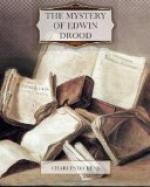’You see, we could not know what you were beforehand, sir; could we?’
‘Clearly not,’ said Mr. Crisparkle.
’And having liked no one else with whom we have ever been brought into contact, we had made up our minds not to like you.’
‘Really?’ said Mr. Crisparkle again.
’But we do like you, sir, and we see an unmistakable difference between your house and your reception of us, and anything else we have ever known. This—and my happening to be alone with you—and everything around us seeming so quiet and peaceful after Mr. Honeythunder’s departure—and Cloisterham being so old and grave and beautiful, with the moon shining on it—these things inclined me to open my heart.’
’I quite understand, Mr. Neville. And it is salutary to listen to such influences.’
’In describing my own imperfections, sir, I must ask you not to suppose that I am describing my sister’s. She has come out of the disadvantages of our miserable life, as much better than I am, as that Cathedral tower is higher than those chimneys.’
Mr. Crisparkle in his own breast was not so sure of this.
’I have had, sir, from my earliest remembrance, to suppress a deadly and bitter hatred. This has made me secret and revengeful. I have been always tyrannically held down by the strong hand. This has driven me, in my weakness, to the resource of being false and mean. I have been stinted of education, liberty, money, dress, the very necessaries of life, the commonest pleasures of childhood, the commonest possessions of youth. This has caused me to be utterly wanting in I don’t know what emotions, or remembrances, or good instincts—I have not even a name for the thing, you see!—that you have had to work upon in other young men to whom you have been accustomed.’
‘This is evidently true. But this is not encouraging,’ thought Mr. Crisparkle as they turned again.
’And to finish with, sir: I have been brought up among abject and servile dependents, of an inferior race, and I may easily have contracted some affinity with them. Sometimes, I don’t know but that it may be a drop of what is tigerish in their blood.’
‘As in the case of that remark just now,’ thought Mr. Crisparkle.
’In a last word of reference to my sister, sir (we are twin children), you ought to know, to her honour, that nothing in our misery ever subdued her, though it often cowed me. When we ran away from it (we ran away four times in six years, to be soon brought back and cruelly punished), the flight was always of her planning and leading. Each time she dressed as a boy, and showed the daring of a man. I take it we were seven years old when we first decamped; but I remember, when I lost the pocket-knife with which she was to have cut her hair short, how desperately she tried to tear it out, or bite it off. I have nothing further to say, sir, except that I hope you will bear with me and make allowance for me.’




